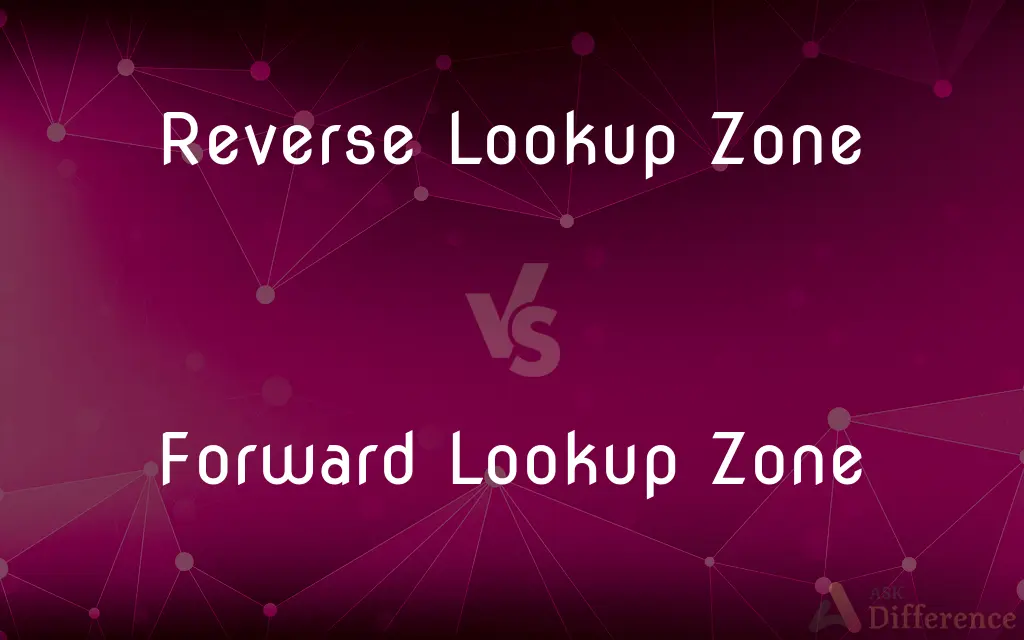Reverse Lookup Zone vs. Forward Lookup Zone — What's the Difference?
By Tayyaba Rehman — Published on January 1, 2024
Reverse Lookup Zone in DNS is used to find the domain name associated with an IP address. Forward Lookup Zone is used to find the IP address associated with a domain name.

Difference Between Reverse Lookup Zone and Forward Lookup Zone
Table of Contents
ADVERTISEMENT
Key Differences
Forward Lookup Zone in DNS (Domain Name System) is a database that converts human-readable domain names (like www.example.com) into IP addresses (like 192.0.2.1). This is the most common type of DNS query, facilitating the process of accessing websites through domain names. Reverse Lookup Zone, conversely, does the opposite; it maps IP addresses back to domain names. This is often used for logging or network troubleshooting.
In a Forward Lookup Zone, DNS records such as A (Address) and AAAA (IPV6 address) records are used. When a user types a URL into their browser, the DNS server uses these records to translate the URL into its corresponding IP address. In a Reverse Lookup Zone, PTR (Pointer) records are used to map an IP address to a domain name.
Forward Lookup Zones are essential for everyday internet use, translating domain names into IP addresses so browsers can load the appropriate webpage. Reverse Lookup Zones are more technical and are primarily used by network administrators to verify which domain name is associated with a specific IP address, often for security or network management purposes.
The creation and maintenance of Forward Lookup Zones are vital for the functionality of the internet, as they ensure users reach the correct website when they enter a domain name. Reverse Lookup Zones, while not as commonly interacted with by average users, play a crucial role in maintaining network security and integrity.
Essentially, Forward Lookup Zones facilitate the normal operation of the internet by connecting domain names to IP addresses, while Reverse Lookup Zones provide a method to validate and investigate IP addresses, primarily used in backend network operations.
ADVERTISEMENT
Comparison Chart
Primary Function
Maps IP addresses to domain names.
Maps domain names to IP addresses.
Key DNS Records
PTR records.
A and AAAA records.
Usage
Used for network troubleshooting and logging.
Used for normal web browsing and internet access.
Importance in Networking
Essential for security and network management.
Crucial for everyday functionality of the internet.
User Interaction
Less direct interaction by average users.
Regularly used by users accessing websites.
Compare with Definitions
Reverse Lookup Zone
Converts IP addresses to associated domain names.
The network admin used the reverse lookup zone to find the domain for the IP.
Forward Lookup Zone
Converts human-readable domains to numeric IP addresses.
Forward lookup zone played a key role in directing users to the right server.
Reverse Lookup Zone
Essential in network security for IP address validation.
The reverse lookup zone helped verify the source IP of the traffic.
Forward Lookup Zone
Translates domain names into corresponding IP addresses.
The forward lookup zone resolved www.example.com to its IP address.
Reverse Lookup Zone
Used for verifying and troubleshooting network connections.
Identifying the server's domain from its IP was done using reverse lookup zone.
Forward Lookup Zone
Facilitates everyday internet use by translating URLs.
Each time you visit a website, the forward lookup zone is queried.
Reverse Lookup Zone
Contains PTR records for DNS reverse lookups.
To trace the IP, a reverse lookup zone query was performed.
Forward Lookup Zone
Contains A and AAAA records for DNS queries.
The DNS server used the forward lookup zone to locate the website's IP.
Reverse Lookup Zone
Maps numeric IP addresses to readable domain names.
Reverse lookup zone resolved the site's IP to its domain name.
Forward Lookup Zone
Integral for accessing websites via domain names.
Browsing the internet involves frequent queries to the forward lookup zone.
Common Curiosities
Why is Reverse Lookup Zone important?
For network security, troubleshooting, and verifying IP addresses.
What does a Forward Lookup Zone do?
It translates domain names into IP addresses.
What is a Reverse Lookup Zone in DNS?
It's a DNS function that maps IP addresses back to domain names.
How often do users interact with Forward Lookup Zones?
Regularly, whenever they access websites through domain names.
What records are found in a Forward Lookup Zone?
A (Address) and AAAA (IPV6 address) records.
What is the main difference between Reverse and Forward Lookup Zones?
Reverse Lookup Zones map IP to domain, while Forward Lookup Zones map domain to IP.
How does Forward Lookup Zone affect website access?
It ensures that entering a domain name takes you to the correct website.
Can a Reverse Lookup Zone enhance network security?
Yes, by allowing verification of the domains associated with IPs.
Is Forward Lookup Zone essential for internet browsing?
Yes, it's crucial for connecting domain names to the correct IP addresses.
What type of DNS record is used in Reverse Lookup Zones?
PTR (Pointer) records.
What role does Reverse Lookup Zone play in DNS logging?
It helps in logging activities by linking IPs to domain names.
Is configuring a Forward Lookup Zone part of DNS setup?
Yes, it's a fundamental part of setting up a DNS server.
Can Reverse Lookup Zone help in network management?
Yes, it's essential for validating and managing network connections.
Are Reverse Lookup Zones used in everyday web activities?
Not directly by users, but they're used in network management and security.
Is knowledge of Forward Lookup Zone important for web developers?
Yes, for understanding how domain names are resolved.
Share Your Discovery

Previous Comparison
Ciliated Epithelial Cell vs. Squamous Epithelial Cell
Next Comparison
Rye Whiskey vs. ScotchAuthor Spotlight
Written by
Tayyaba RehmanTayyaba Rehman is a distinguished writer, currently serving as a primary contributor to askdifference.com. As a researcher in semantics and etymology, Tayyaba's passion for the complexity of languages and their distinctions has found a perfect home on the platform. Tayyaba delves into the intricacies of language, distinguishing between commonly confused words and phrases, thereby providing clarity for readers worldwide.
















































